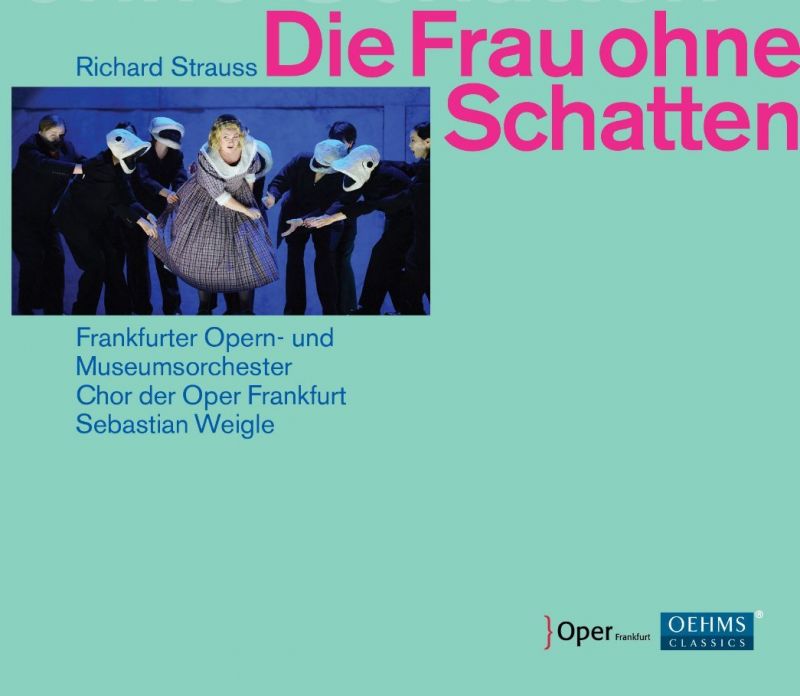STRAUSS Die Frau ohne Schatten
View record and artist detailsRecord and Artist Details
Genre:
Opera
Label: Oehms
Magazine Review Date: 12/2015
Media Format: CD or Download
Media Runtime: 193
Mastering:
DDD
Catalogue Number: OC964

Tracks:
| Composition | Artist Credit |
|---|---|
| (Die) Frau ohne Schatten |
Richard Strauss, Composer
Burkhard Fritz, Emperor, Tenor Dietrich Volle, Spirit Messenger, Baritone Frankfurt Opera and Museum Orchestra Frankfurt Opera Chorus Richard Strauss, Composer Sabine Hogrefe, Barak’s Wife, Soprano Sebastian Weigle, Conductor Tamara Wilson, Empress, Soprano Tanja Ariane Baumgartner, Nurse, Mezzo soprano Terje Stensvold, Barak, Baritone |
Author: Hugo Shirley
Oehms’s sound nevertheless has some of the same problems encountered in its previous Frankfurt releases, with some voices especially put at a disadvantage from being closely miked, without much acoustic air around them. Terje Stensvold’s Barak probably suffers most in this regard, and it’s undeniable that the veteran baritone – bidding farewell to the house in this run of performances – sounds dry and a bit crumbly, vocally speaking, even if he still communicates nobility and humanity. Burkhard Fritz’s Emperor is also more workmanlike than rousingly heroic, although he sings with admirable security.
At the other end of the vocal spectrum, however, things are often outstanding. Tamara Wilson is in ringingly clear, gleaming voice as the Empress, on top of all the notes right from the tricky bird-like twiddles in her first appearance to the fearsome top D flat in her big Act 2 scene, unleashed with thrilling power and accuracy. Above all, she movingly communicates the necessary sense of burgeoning humanity as the character develops throughout the opera. Tanja Ariane Baumgartner makes a vivid Amme, and Sabine Hogrefe, although a touch unwieldy in her vibrato, sings powerfully as the Wife. There are some fine further contributions from the large cast, even if the balancing is unkind to the Voices of the Unborn Children.
What binds it all together so compellingly, though, is the conducting of Sebastian Weigle, and the fabulous playing of his orchestra. Weigle is not one to dawdle, but has a Böhm-like ability to keep things moving without the sense of impatience that Solti brings to the score in his lavish studio set. He communicates the power of the work as drama, and the pacing of the Emperor’s and Empress’s scenes in Act 2 is especially effective, while the great orchestral interludes are thrilling and moving by turns. The recording also captures the orchestra well: it sounds transparent and light on its feet in a way that emphasises less the lavish resources the work calls for than the economy and intelligence with which Strauss in fact employs them. The lack of libretto translation and some vocal raggedness will disqualify the set as a first choice – and those wanting studio sound will probably opt for Sawallisch’s EMI set, the only other uncut CD version besides the Solti – but this new set adds up, the more one listens, to a genuinely compelling dramatic experience. Admirers of this opera will not want to be without it.
Discover the world's largest classical music catalogue with Presto Music.

Gramophone Digital Club
- Digital Edition
- Digital Archive
- Reviews Database
- Full website access
From £8.75 / month
Subscribe
Gramophone Full Club
- Print Edition
- Digital Edition
- Digital Archive
- Reviews Database
- Full website access
From £11.00 / month
Subscribe
If you are a library, university or other organisation that would be interested in an institutional subscription to Gramophone please click here for further information.




